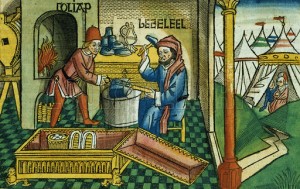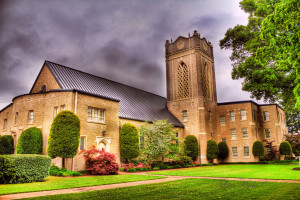 Exodus 31
Exodus 31
1 The Lord said to Moses, 2 “See, I have called by name Bezalel the son of Uri, son of Hur, of the tribe of Judah, 3 and I have filled him with the Spirit of God, with ability and intelligence, with knowledge and all craftsmanship, 4 to devise artistic designs, to work in gold, silver, and bronze, 5 in cutting stones for setting, and in carving wood, to work in every craft. 6 And behold, I have appointed with him Oholiab, the son of Ahisamach, of the tribe of Dan. And I have given to all able men ability, that they may make all that I have commanded you: 7 the tent of meeting, and the ark of the testimony, and the mercy seat that is on it, and all the furnishings of the tent, 8 the table and its utensils, and the pure lampstand with all its utensils, and the altar of incense, 9 and the altar of burnt offering with all its utensils, and the basin and its stand, 10 and the finely worked garments, the holy garments for Aaron the priest and the garments of his sons, for their service as priests, 11 and the anointing oil and the fragrant incense for the Holy Place. According to all that I have commanded you, they shall do.”
Christianity Today once published an anonymous poem that I thought made a pretty witty point about service.
There’s a clever young fellow named Somebody Else –
There’s nothing this fellow can’t do.
He’s busy from morning ’til late at night
Just substituting for you.
When asked to do this or asked to do that
So often you’re set to reply:
“Get Somebody Else, Mr. Chairman –
He’ll do it much better than I.”
There’s so much to do in our church;
So much, and the workers are few.
And Somebody Else gets weary and worn
Just substituting for you.
So next time you’re asked to do something worthwhile
Come up with this honest reply:
If Somebody Else can give time and support,
It’s obviously true, so can I.[1]
Whoever wrote this is correct: that “Somebody Else” is a popular fellow indeed! We all know him and we have all, if we are honest, appealed to him to do something that we do not really want to do. But in the Kingdom of God we cannot cross our fingers and hope that “Somebody Else” will somehow magically take care of what needs to be done. The people of God—all of us—are to be a servant and serving people.
Why, then, do many of us not serve? Perhaps sometimes it is for ignoble reasons: laziness, disinterestedness, etc. But I rather think that many times folks do not serve because they do not think they have anything to offer. But on this point we can simply cry, “False!” For the God who calls us to serve not only calls us to do so, He equips us to do so! More than that, he does not call only those who are viewed by people as exceptionally gifted. He calls us all, the extraordinary and the “ordinary.” But here we must recognize a very important truth: in the Kingdom of God, there is no ordinary! The ordinary is extraordinary in the hands of a great God!
Exodus 31 begins with an example of just this point.

 Mark 12
Mark 12 Exodus 30
Exodus 30


 Southwestern Baptist Theological Seminary started posting old chapel audio earlier this week. Fascinatingly, they posted an October 11, 1957 chapel sermon from James Leo Garrett, Jr. that just so happens to be chapter 2 of the forthcoming Collected Writings of James Leo Garrett, Jr., 1950-2015.
Southwestern Baptist Theological Seminary started posting old chapel audio earlier this week. Fascinatingly, they posted an October 11, 1957 chapel sermon from James Leo Garrett, Jr. that just so happens to be chapter 2 of the forthcoming Collected Writings of James Leo Garrett, Jr., 1950-2015.  1 John 5
1 John 5 Just a little note to say that I am preaching revival services at First Baptist Church, Newport, Arkansas, this week so there will be no sermon audio or manuscripts posted until next week. It has been an honor to be able to spend time in worship this week with this wonderful church, with Greg Dills, their pastor, and with Billy Davis, the Central Baptist Church Minister of Music who is leading the worship team in revival this week. Please pray for tonight’s concluding meeting. We’ve seen the Lord do amazing things!
Just a little note to say that I am preaching revival services at First Baptist Church, Newport, Arkansas, this week so there will be no sermon audio or manuscripts posted until next week. It has been an honor to be able to spend time in worship this week with this wonderful church, with Greg Dills, their pastor, and with Billy Davis, the Central Baptist Church Minister of Music who is leading the worship team in revival this week. Please pray for tonight’s concluding meeting. We’ve seen the Lord do amazing things! Job 40
Job 40